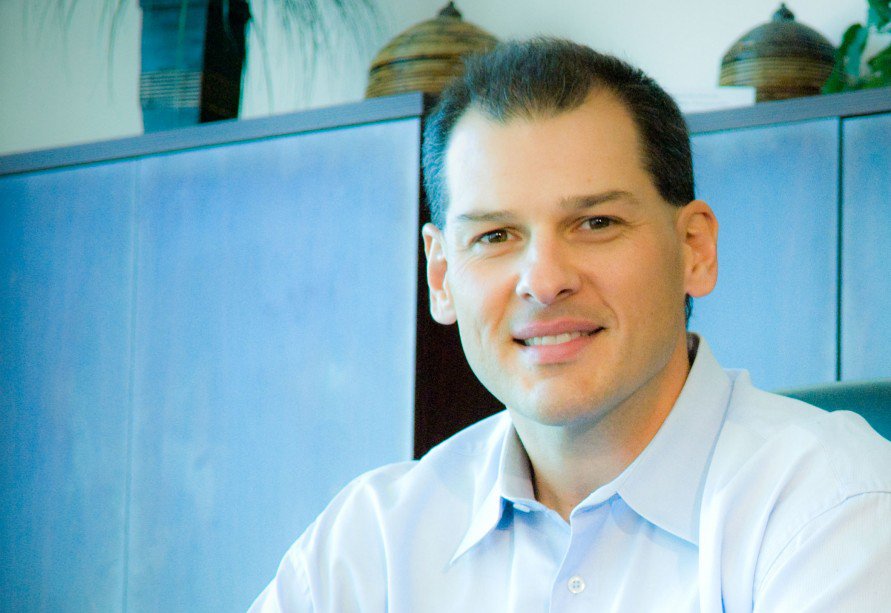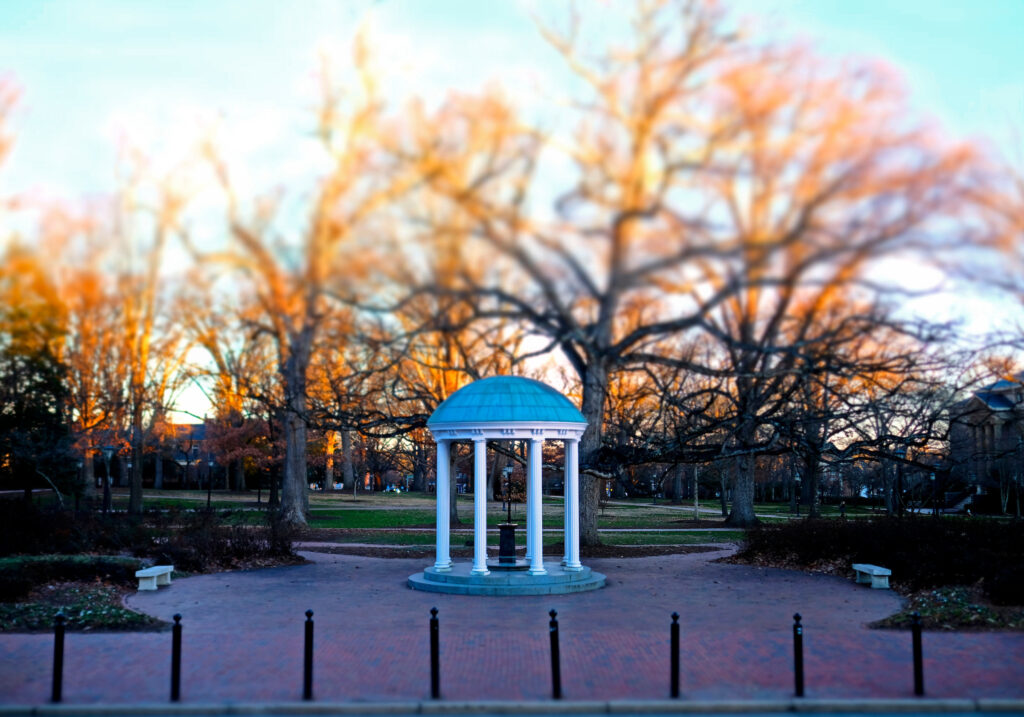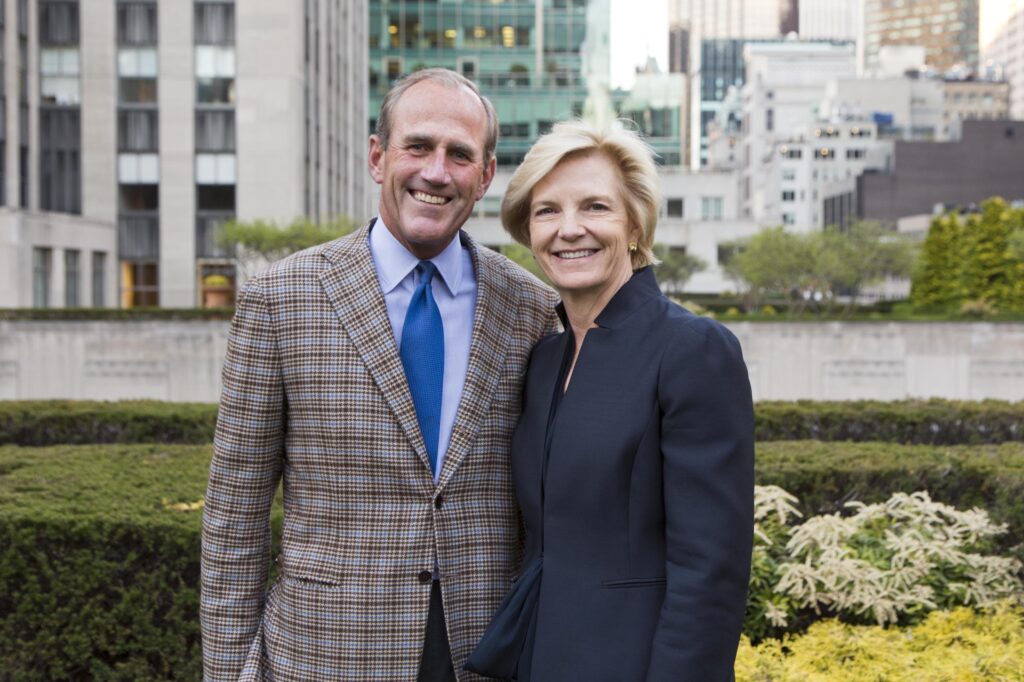Candid Conversations With Influential Innovators
March 30, 2022
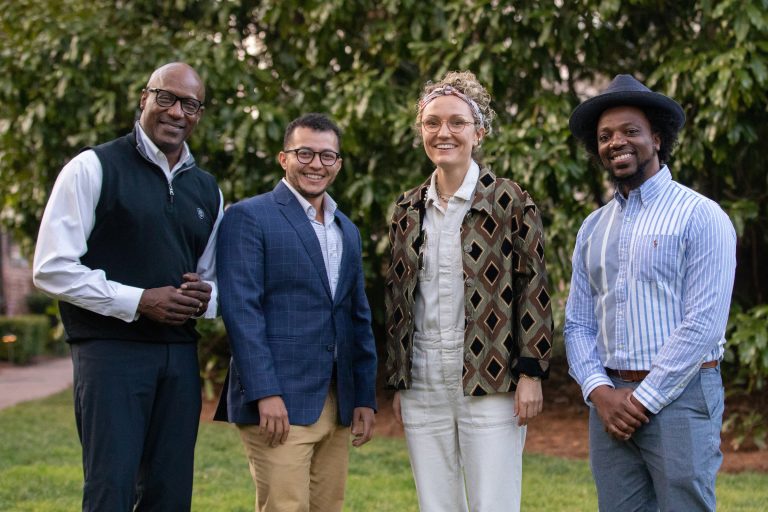
Kicking off the first cohort of Shuford Innovators-in-Residence. From left: Bernard Bell, Soltan Bryce, Mackenzie Thomas and Dedren Snead.
The first cohort of Shuford Innovators-in-Residence share diverse expertise and experiences with students in the Shuford Program in Entrepreneurship in the UNC College of Arts and Sciences.
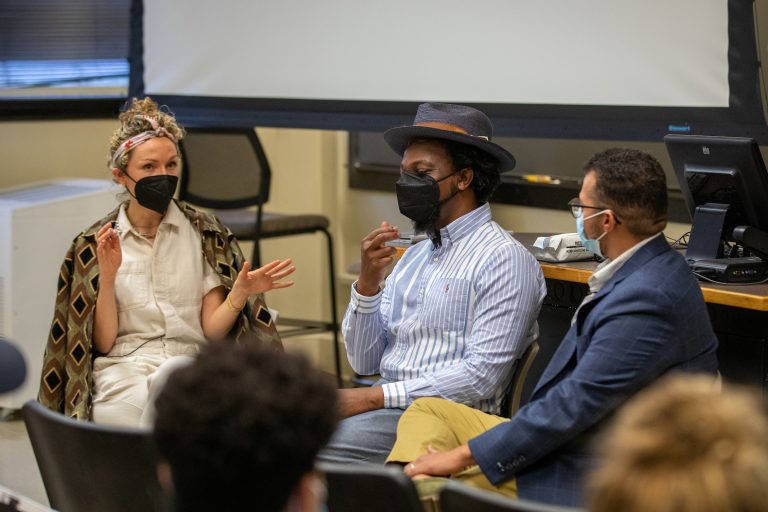
Bernard Bell ’82, ’91 (MBA), the executive director of the Shuford Program in Entrepreneurship at UNC-Chapel Hill, emphasizes the importance of managing relationships through networking in his practicum in entrepreneurship class. He often selects students to roleplay various engagement scenarios as they work to hone the skills they’ll need as company founders and leaders beyond Carolina.
So it’s no surprise that the genesis of the Shuford Innovators-in-Residence program was a conversation at a cocktail party hosted by Carolina alum Robin Richards Donohoe ’87 in San Francisco. Practicing what he teaches, Bell met and quickly found common ground with Carolina alum Mackenzie Thomas ’13, product and marketing inclusion lead for Google’s consumer apps team.
“We started talking about the need to improve inclusivity and diversity at UNC-Chapel Hill and specifically in the entrepreneurship minor,” recalled Bell, “and we quickly got to a place where we had an authentic conversation.”
Within a year, Thomas was knocking on Bell’s office door to discuss anything from shaping more inclusive syllabi for economics classes to the notion of “belonging” in the areas of academia and entrepreneurship.
“Those conversations allowed me to think more comprehensively on how to broaden the traditional concept of diversity and inclusivity,” shared Bell. “Mackenzie challenged me to think about how innovation can be leveraged to extend across every area of your life. She’s amazing.”
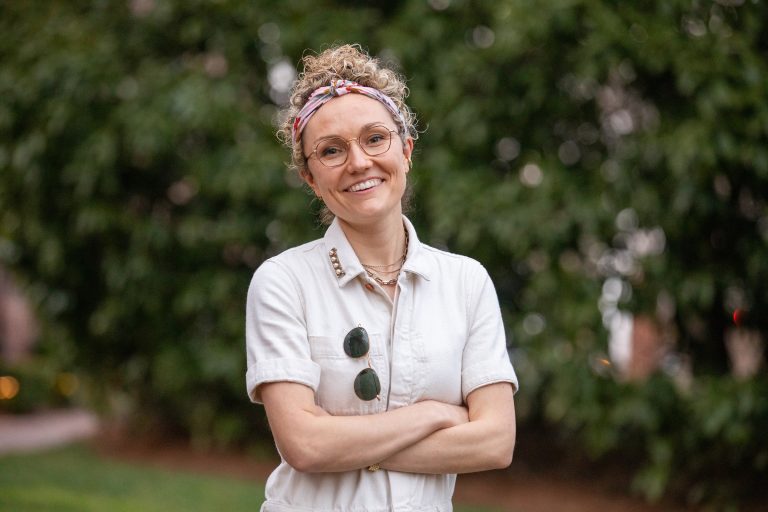
The Inaugural Resident
In 2019, Bell brought Thomas to campus as the first Shuford Innovator-in-Residence, a program the two developed to bring industry subject matter experts to campus — but with an intentional twist. The program focuses on celebrating diversity of personal and professional backgrounds, experiences and identities.
Thomas was a fitting inaugural innovator-in-residence: In her role at Google, she consults with engineering, design and research teams to ensure products work equitably for all communities. She also started CPAN, the Carolina Pride Alum Network, in 2017, which has since grown to include more than 1,200 LGBTQ+ alumni. She said she looks at the impact of the Shuford Innovators-in-Residence program through two lenses.
“As a white cisgender woman, there’s a lot of people on campus who look like me, but I had never — from the time I stepped on campus to when I graduated — had any professors or mentors who were out as fellow queer women. So I didn’t really grapple with my own identity and reckon with that until the end of college.”
“On the other side of that,” she continued, “I aim to use my own identity as something that can be empowering for another student.”
The Inaugural Cohort
Thomas now serves as a board member of the Shuford Innovators-in-Residence program, which has expanded from her initial residency in 2019 to a cohort of seven residents in 2022. The cohort of Carolina alums represents a variety of backgrounds and a wide range of disciplines, including health care, entertainment, afrofuturism, venture capital, arts and e-commerce.
“This cohort is unique because beyond their impressive accomplishments, we tried to look at who each person is from the inside out,” said Thomas. “What was their journey like; how do they challenge the status quo; and what core values do they lead with? Through candid conversations with these amazing folks, the program allows the students to see where they can go, always remembering where they’ve been.”
This spring, two members of the inaugural cohort, Soltan Bryce ’13 and Dedren Snead ’12, spent a full week on campus. They were featured guest speakers in several economics and public policy classes; they held open office hours and spoke to students at Global Career Night; and they participated in fireside chats emceed by Thomas.
Soltan Bryce — a Morehead-Cain Scholar — is now a Harvard Business School Leadership Fellow and special assistant to the chief operating officer and executive vice president of strategy at Boston Medical Center Health System. While attending Harvard Business School, he helped launch Plume, a venture-backed digital health company focused on gender-affirming care.
During his Shuford residency at Carolina, Bryce talked openly about his family’s background as Palestinian refugees who settled in Rocky Mount, North Carolina, and how his upbringing and identity inspired his career in improving health care access, affordability and equity. He encouraged students to create the world they want to live in and shared how he’s pushed against expectations to make room for himself throughout his career.
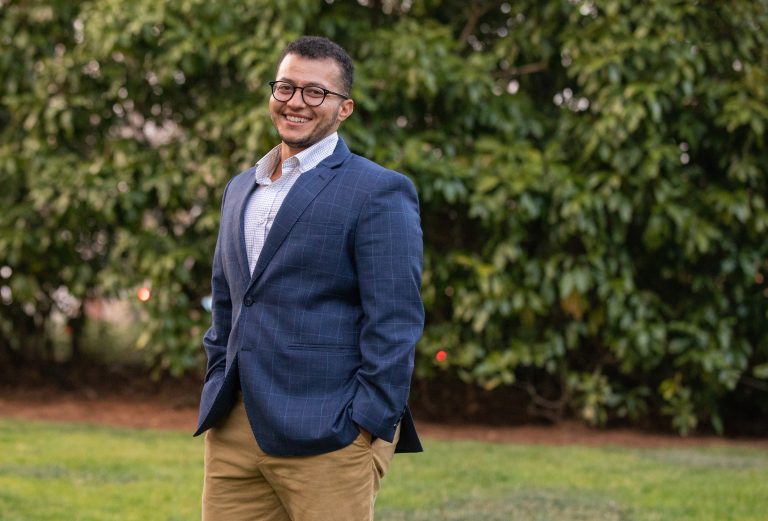
“Soltan’s talk was eye-opening,” said Vivian Karamitros ’22, a Carolina Innovation Scholar majoring in statistics and analytics and minoring in entrepreneurship. “I have never had a class where speakers were so honest and open. The Shuford Innovators-in-Residence program has given me the opportunity to speak with high-achieving and personable people about topics I’m interested in, such as NFTs and product management. They have been so helpful in office hours, sharing their knowledge and helping me with my resume.”
Dedren Snead is a creative consultant from Snow Hill, North Carolina, currently based in Atlanta. His first job out of Carolina was working at Lexus in their international marketing department: He was on the team that spearheaded the product placement that put Black Panther in a Lexus. He is also a social futurist and Web 3.0 technologist. His entrepreneurial endeavors include SUBSUME, a gamified learning platform that connects K-20 students to creative and technical training for future-ready workforce development. He is currently listed as one of the top 100 thought leaders in the Metaverse and is an artist-in-residence with the Creative Media Industries Institute at Georgia State University.
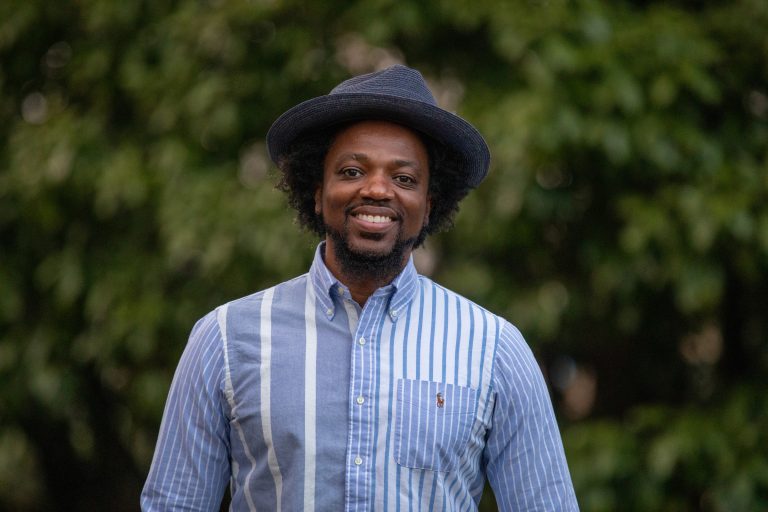
During his week-long residency at Carolina, Snead talked about afrofuturism and his creative studio work, which utilizes graphic novels, video games and animation along with mobile applications and augmented reality to build inclusive storytelling and cultural equity in popular media.
An additional treat for students, Thomas hosted fireside chats with Bryce and Snead, where the three spoke even more candidly on a range of topics and answered questions from the audience.
“I especially appreciated how Dedren and Soltan played off one another,” Thomas said. “They are very different people in two very different industries, yet they’re both using history as a prism to do better work and as a point of innovation while respecting and celebrating the people who’ve come before us.”
“Watching the Shuford Innovators-in-Residence discuss their efforts in the respective fields was inspiring and emphasized the importance of diversity, equity and inclusion in all areas of our community,” said Emma Amaglo ’22, a Shuford Ambassador and journalism and media student at UNC-Chapel Hill. “I’m grateful for them and their efforts because they pave a way for others to use their passion and drive change. That’s what the Shuford Program is all about: figuring out what makes you stand out and leveraging that to drive change.”
The Shuford Innovators-in-Residence program will continue with the next group of innovators visiting campus in fall of 2022. Visit shuford.unc.edu for more information about the residency program and the Shuford Program for Entrepreneurship.
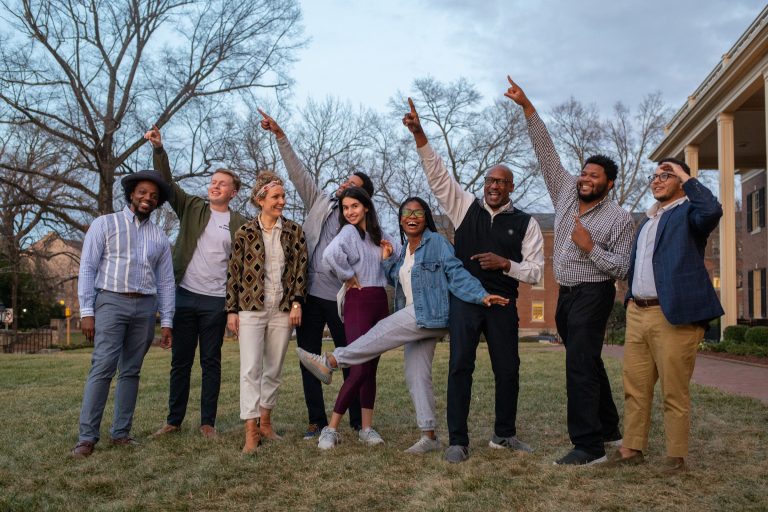
Reverberating Impact
The Shuford Innovators-in-Residence program is one of the many ways the Shuford Program for Entrepreneurship is making an impact at UNC-Chapel Hill. The program supports students in interdisciplinary academic and applied entrepreneurship experiences, with focused courses in a variety of areas and local and global internships.
The Shuford Program was endowed in 2017 through an $18 million gift that counts toward the Campaign for Carolina, the most ambitious fundraising campaign in the University’s history, which comes to a close on December 31, 2022.
“The Shuford family’s gift has allowed us to have financial advantages that we didn’t have before,” said Bell. “Now we can send students to Shanghai for the summer or for a semester in San Francisco or London; we can fund internships. It’s really allowed us to reach more students.”
Story courtesy of University Development

